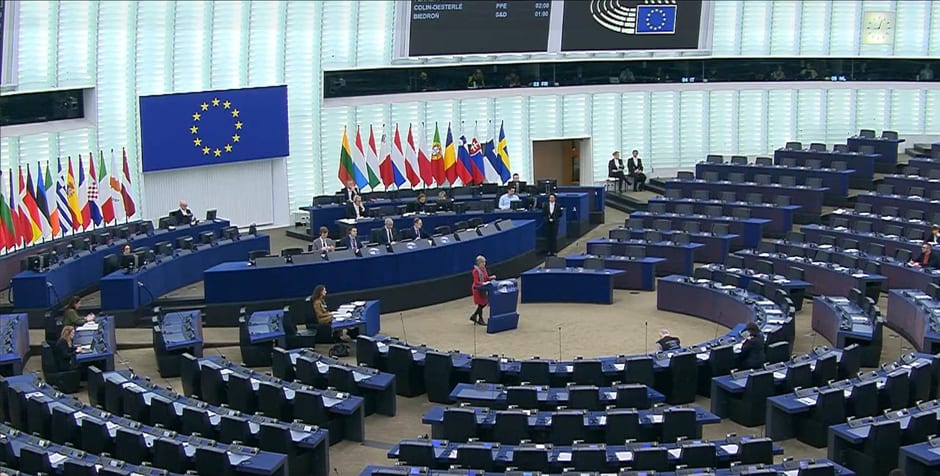

European Union: Arguments Against Adding Abortion to the Charter
EU: Arguments Against Adding Abortion to the Charter
On March 14, the plenary session of the European Parliament in Strasbourg debated Emmanuel Macron’s proposal to add a “right to abortion” to the Charter of Fundamental Rights of the European Union (EU). This Charter, which has the same legal value as an international treaty, is binding on the national law of each Member State. Such an amendment to the Charter would prevent States that have ratified it from restricting access to abortion.
The resolution considered by the European Parliament will have no effect on the Charter. It is, however, part of Emmanuel Macron’s campaign to convince other EU member states to add a “right to abortion” to the Charter. On the eve of the debate, ECLJ sent MEPs the letter below with legal, political, and social arguments. During the debate, which can be viewed on replay, MEPs from the EPP (European People’s Party) and ECR (European Conservatives and Reformists) used some of these arguments.
The resolution itself will be debated at the next plenary session of the European Parliament in April 2024.
___________
Dear MEPs,
A debate is scheduled for tomorrow, March 14th, at 9:00 am during the plenary session of the European Parliament on the “Inclusion of the right to abortion in the Charter of Fundamental Rights of the EU.”
The European Centre for Law and Justice (ECLJ) is providing you with some information on this subject, which you are free to use extensively.
The ECLJ considers abortion to be an extremely important issue. If the European Parliament decides to address it once again, it should do so constructively, with the aim of recommending a social policy for the prevention of abortion, to reduce the risks associated with abortion. This is a matter of public health.
Legal arguments
The proposed modification, considering the inclusion of a “right” to abortion in the Charter of Fundamental Rights of the EU, lacks legal merit.
To amend the Charter, unanimity among EU member states is required. However, numerous states already oppose any modification, rendering the opinion of the European Parliament ineffective in this regard.
Furthermore, the contemplated amendment is incompatible with the Charter itself, as Article 51 stipulates that the Charter applies when member states implement EU law and cannot exceed EU competencies. Abortion falls within the competencies of member states, as health policy is not a European competence. Article 168 of the Treaty on the Functioning of the European Union related to public health states in its paragraph 7 that, “Union action shall respect the responsibilities of the Member States for the definition of their health policy and for the organization and delivery of health services and medical care.”
In addition, the EU member states have signed and ratified a Protocol regarding the concerns of the Irish people regarding the Lisbon Treaty (2012). Article 1 of this protocol states that the Charter cannot affect the legislation of states protecting the right to life of children before birth.
Moreover, no European or international human rights treaty or system establishes abortion as a right. The right to life is protected in various treaties, and there is even international protection for children before birth in the Convention on the Rights of the Child.
The European Court of Human Rights has emphasized that the Convention "cannot be interpreted as endorsing a right to abortion." Similarly, the Court of Justice of the European Union (CJEU), in the 2011 Brüstle/Greenpeace judgment, reiterated the protection afforded to human embryos in the context of the respect due to human dignity.
On the contrary, European states have committed to the action plan of the International Conference on Population and Development (ICPD) held in Cairo in 1994, aiming to "reduce the recourse to abortion" and to "take appropriate measures to help women avoid abortion." According to this Declaration, "everything should be done to eliminate the need for abortion." This commitment has been reiterated since, notably in the action plan of the World Conference on Women held in Beijing in 1995.
Social arguments
The sociology of women undergoing abortion reveals the social determinism of abortion: the poorer and more isolated a woman is, the more she is exposed to the risk of undergoing an abortion. For instance, in France, according to the DREES, single women have a 37% higher risk of undergoing an abortion compared to women in a relationship. As for women belonging to the poorest 10%, their risk of undergoing an abortion is 40% higher than the richest 10%, with the same age group and marital situations.
Abortion often causes psychological trauma and physical pain, especially when performed medicinally. According to a 2020 IFOP survey, 92% of French women state that abortion leaves difficult emotional traces, rising to 96% among those aged 25-34. Furthermore, 42% of women who have had an abortion before the age of 25 suffer from depression, and the suicide rate is multiplied by 6.5 among women who have had an abortion compared to those who have given birth.
Additionally, women who have undergone abortion are three times more likely to experience physical, mental, or sexual violence than those have carried their pregnancy to term.
Political arguments
Several resolutions have already been passed by the European Parliament on the same subject. Unless the new resolution recommends the adoption of a policy for the prevention of abortion, a repetitive resolution would be a waste of your time and a taxpayer money.
This proposed resolution is purely opportunistic, aiming to fuel the campaign of the Renaissance party (RENEW group) for the European elections. Emmanuel Macron initiated this debate with explicit goal.
Emmanuel Macron understands adding to the Charter will not succeed, as he had attempted to do so during the French presidency of the EU. Macron abandoned this project due to encountered difficulties.
All deputies promoting the inclusion of abortion in the Charter will serve RENEW campaign for the European elections, especially at the French level.
On a European scale, this initiative only serves to deepen divisions within the Union and fuel a form of cultural warfare between EU countries.
It does not in any way improve the situation for women, for whom the main problem is not access to abortion itself, its root causes, and consequences.
Abortion in Europe
Emmanuel Macron is not in a position to provide lessons on this matter. Not only is the abortion rate in France the highest in Europe, but it is not decreasing, unlike other European countries. France went from 202,180 abortions in 2001 to 234,300 in 2022, reaching an all-time high. In contrast, abortion has been halved in Italy since 2000, decreasing from 135,133 to 63,653. The same trend is observed in Germany, where it went from 134,609 to 94,596 according to Eurostat.
This decrease is not solely due to the aging population, as the abortion rate per birth has significantly dropped. According to Destatis and Istat, between 2001 and 2021, it went from 151 to 119 abortions per 1000 births in Germany and from 265.9 to 159 abortions per 1000 births in Italy. In France, it remains around 300 abortions per 1000 births (INED). In Hungary, the abortion rate has been halved between 2010 and 2021, going from 40,449 to 21,907 abortions per year, without any restrictions on access to abortion. This is not due to the aging population but to a social policy. The abortion rate per woman of childbearing age has decreased by more than 42% over this period, from 16.9 to 9.8 abortions per 1000 women.
This decline is evidence that a prevention policy can, within a few years, significantly reduce the use of abortion without even restricting its legal access conditions.
We remain at your disposal for any additional information on the arguments presented above.
Sincerely yours,
Nicolas Bauer
Grégor Puppinck (Directeur)












